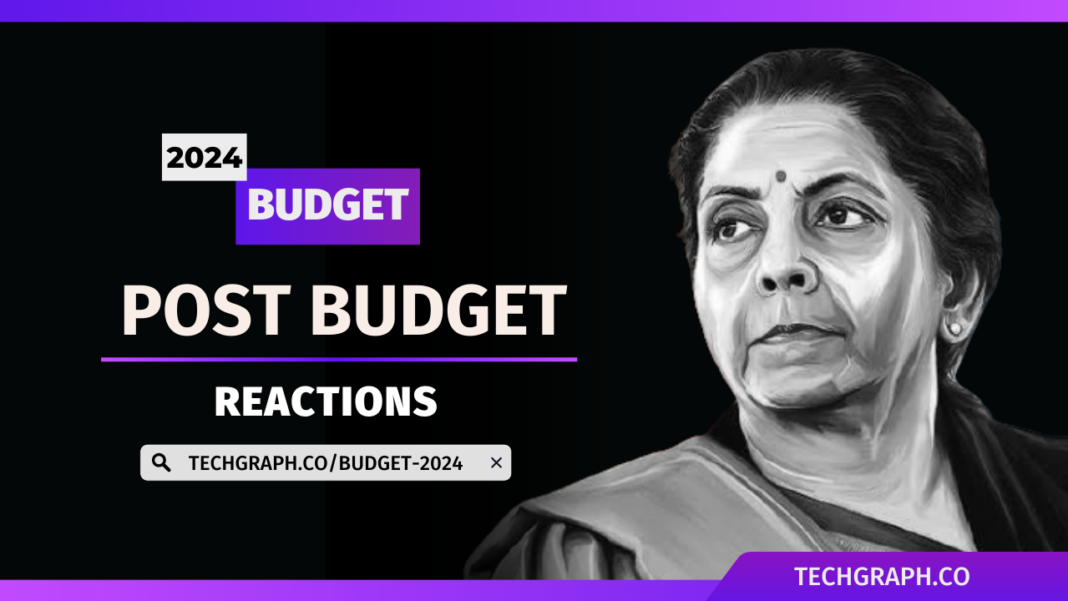Following the recent proposal of the Interim Budget 2024 by Finance Minister Nirmala Sitharaman, business leaders across various sectors have shared their perspectives, highlighting both optimism and cautious optimism towards the proposed fiscal measures.
Here’s a comprehensive overview of the diverse reactions from industry leaders following the budget announcement:
Ravi Saxena, Founder & CEO, Wonderchef
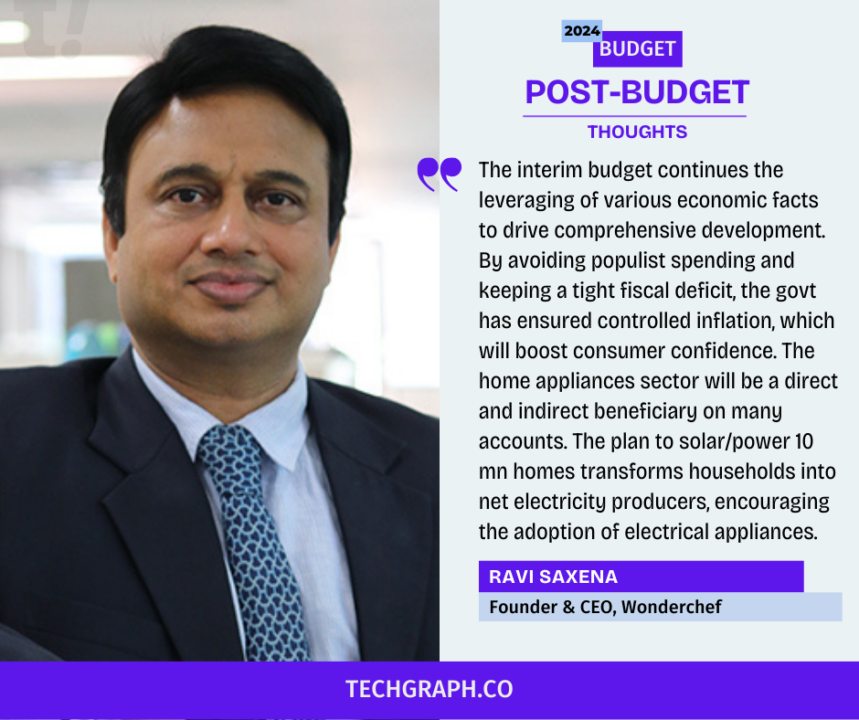
The interim budget continues the leveraging of various economic facts to drive comprehensive development. By avoiding populist spending and keeping a tight fiscal deficit, the government has ensured controlled inflation, which will boost consumer confidence. The home appliances sector will be a direct and indirect beneficiary on many accounts. The plan to solar/power 10 million homes transforms households into net electricity producers, encouraging the adoption of electrical appliances. Promoting domestic tourism, and introducing a central rating system will encourage the adoption of quality cookware and appliances to meet the demands and expectations of local and global tourists.
Investments in homes, logistics, railways, and airports will result in enhancing accessibility, ensuring efficiency, and creating jobs to revitalize our consumption-driven economy. This holistic approach encompassing infrastructure, retail, homes, Indian manufacturing, employment generation and exports forms a cohesive strategy for comprehensive and sustainable development.
Darshil Shah, Founder and Director, TreadBinary
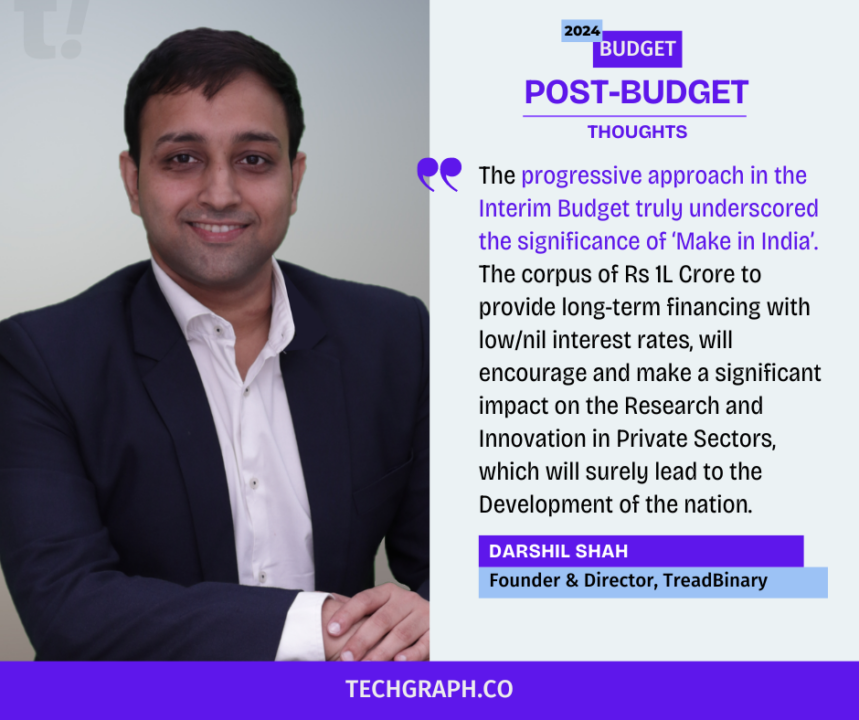
The progressive approach in the Interim Budget truly underscored the significance of ‘Make in India’. The corpus of Rs 1L Crore to provide long-term financing with low/nil interest rates, will encourage and make a significant impact on the Research and Innovation in Private Sectors, which will surely lead to the Development of the nation.
The FDI- First Develop India spirit will further strengthen the process, and the schemes for green growth will be a commendable way forward keeping the environment as a top priority along with the nation. Overall, it was a well-balanced budget catered not only to research, and innovation but also to green growth, solidifying India’s position as a global tech hub.
Aryann Suri, Director Sales & Operations, Space Creattors Heights
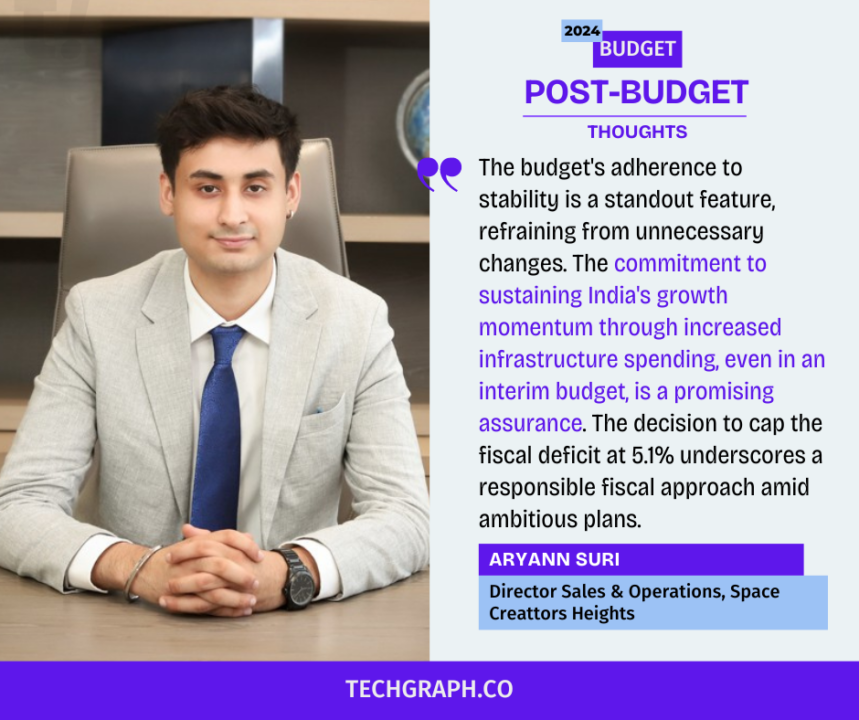
The budget’s adherence to stability is a standout feature, refraining from unnecessary changes. The commitment to sustaining India’s growth momentum through increased infrastructure spending, even in an interim budget, is a promising assurance. The decision to cap the fiscal deficit at 5.1% underscores a responsible fiscal approach amid ambitious plans. Inclusivity, with a focus on women and the downtrodden, remains a priority, ensuring equitable progress. Despite challenges like COVID and geopolitical tensions, the government’s promise to continue and reform, stimulating private investment and fortifying the public sector, reflects a determined effort to navigate complexities successfully.
Akash Sinha, Co-founder & CEO, Cashfree Payments
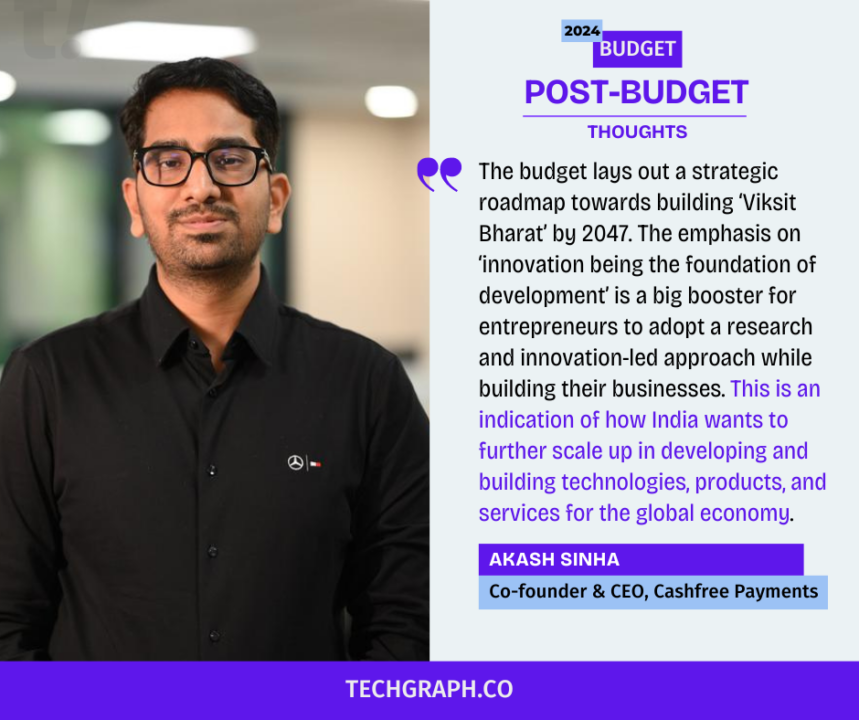
The budget lays out a strategic roadmap towards building ‘Viksit Bharat’ by 2047. The emphasis on ‘innovation being the foundation of development’ is a big booster for entrepreneurs to adopt a research and innovation-led approach while building their businesses. This is an indication of how India wants to further scale up in developing and building technologies, products, and services for the global economy.
The focus on Digital Public Infrastructure reflects the government’s ambition towards inclusive growth and development through the process of digitization. The strong emphasis on technology, research, and innovation coupled with financial support will have a huge multiplier impact on employment and entrepreneurship leading to sustainable growth and opportunity creation for the youth.
Amit Relan, Co-founder and CEO, mFilterIt
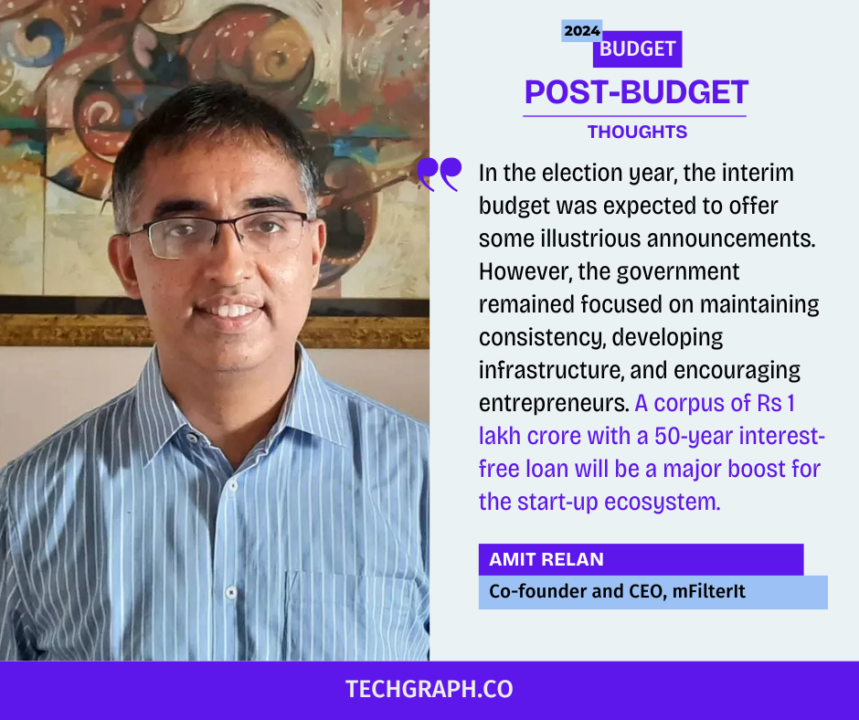
In the election year, the interim budget was expected to offer some illustrious announcements. However, the government remained focused on maintaining consistency, developing infrastructure, and encouraging entrepreneurs. For budding entrepreneurs, this is a golden period of growth. A corpus of Rs 1 lakh crore with a 50-year interest-free loan will be a major boost for the start-up ecosystem. The long-term financing and re-financing will encourage the private sector to scale up research and innovation to chart new horizons.
The Indian entrepreneurs are also becoming ‘rozgardata’. The Fund of Funds, Start-Up India, and Start-Up Credit Guarantee schemes are assisting our youth. Also, a drop in corporate tax rate from 30 percent to 22 percent for existing domestic companies and to 15 percent for certain new manufacturing companies is a step in the right direction encouraging existing business and will have a positive long-term impact on the market.
Anirudh A Damani, Director, Artha India Ventures
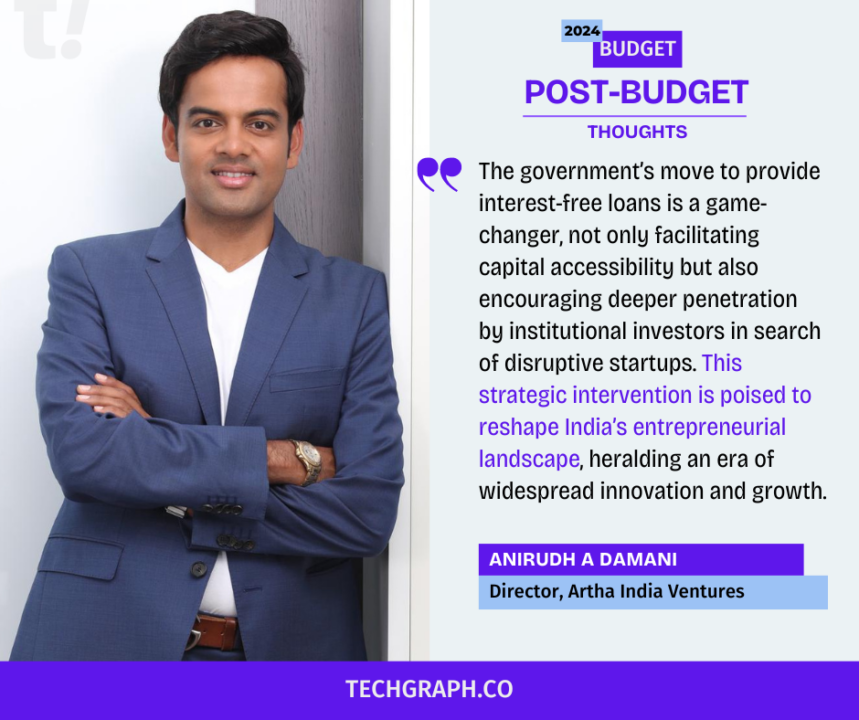
In this year’s interim budget, the Finance Minister has adeptly spotlighted the government’s dedication to pivotal sectors poised to elevate GDP growth, with a particular focus on empowering youth, women, and micro-entrepreneurs. This commitment is further enriched by an ambitious agenda to enhance digital infrastructure, aiming to foster entrepreneurship nationwide and boost employment opportunities.
Notably, the budget’s provisions for EV and deep tech sectors signal a continued allure for venture capital in startups, reinforcing investor confidence. The introduction of a Rs 1 lakh crore corpus for long-term, interest-free loans emerges as a landmark initiative, promising to invigorate entrepreneurship in tier 2 and 3 towns.
Our experience over the past decade affirms the high potential of these regions as the cradle for India’s next 100 unicorns, where access to early-stage capital has remained elusive. The government’s move to provide interest-free loans is a game-changer, not only facilitating capital accessibility but also encouraging deeper penetration by institutional investors in search of disruptive startups. This strategic intervention is poised to reshape India’s entrepreneurial landscape, heralding an era of widespread innovation and growth.
Amit Khatri, Co-Founder, Noise
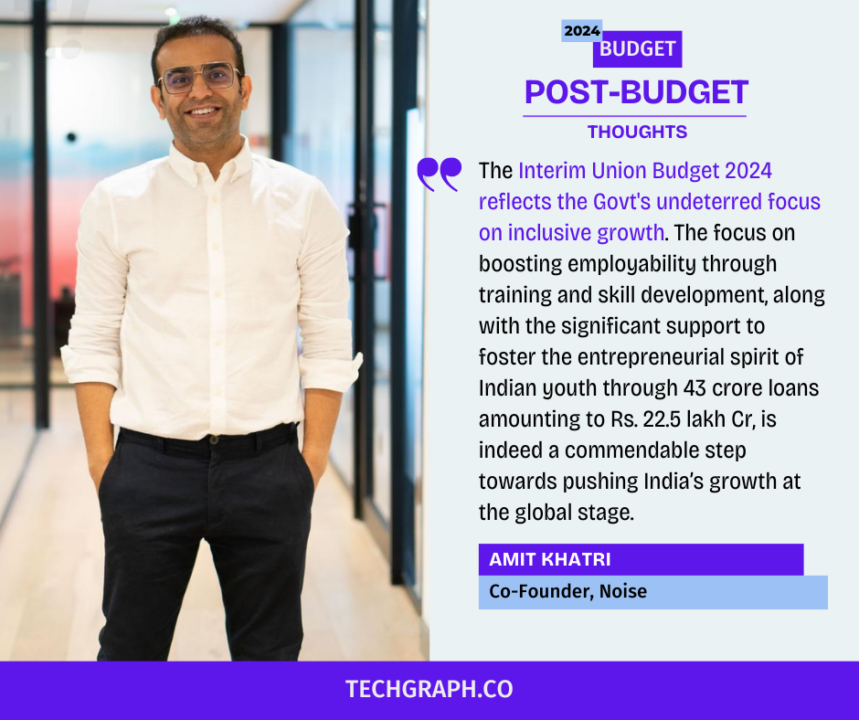
The Interim Union Budget 2024 presented by FM Nirmala Sitharaman reflects the Government’s undeterred focus on inclusive growth. The focus on boosting employability through training and skill development, along with the significant support to foster the entrepreneurial spirit of Indian youth through 43 crore loans amounting to Rs. 22.5 lakh Crore, is indeed a commendable step towards pushing India’s growth at the global stage. These reforms encourage us to work towards India’s vision to become a developed nation by 2047 through enhanced capability and empowerment.
Being a homegrown brand, we believe that initiatives like PM Mudra Yojana & Start Up India will play a crucial role in catalyzing the growth of the startup ecosystem in India and eventually further strengthen the ‘Make in India’ efforts. We appreciate the economic policies adopted to foster growth, improve productivity, increase opportunity, and fulfill aspirations through strategic technological advancements. Driven by the vision of Vikasit and Aatmanirbhar Bharat, we look forward to actively participating in the nation’s journey towards global prominence and innovation leadership.
Jaya Vaidhyanathan, CEO, BCT Digital
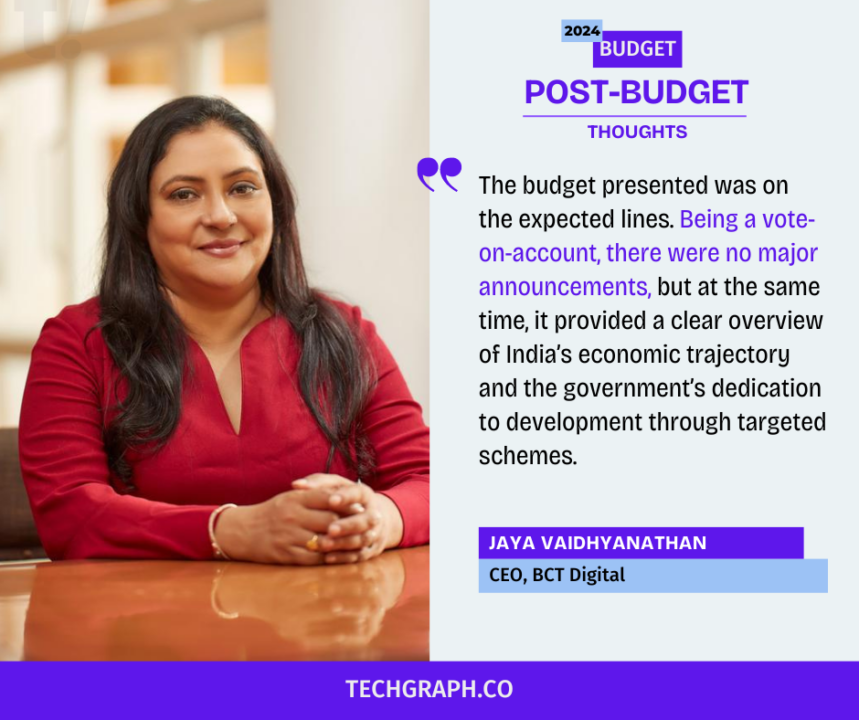
The budget presented was on the expected lines. Being a vote-on-account, there were no major announcements, but at the same time, it provided a clear overview of India’s economic trajectory and the government’s dedication to development through targeted schemes. Revenue receipts for the year exceeding budget estimates, robust growth in GST collections, and a fiscal deficit at 5.8% of GDP – lower than anticipated – all indicate robust economic growth. This is bolstered by the formalization of the economy, which will have a positive impact on the banking system that lends to the formal economy. Further, despite the huge amount of welfare measures in place, the strong revenue figures have kept the fiscal deficit in check – used at 5.1% in FY25 and on track for 4.5% by FY26.
Significant capital expenditure growth of over 11% this year, accounting for 3.4% of GDP, underlines the focus on key areas like railway infrastructure and green energy. This is expected to transform the country while also ensuring employment generation to harness the demographic dividend. Specific steps like viability gap funding and other financial assistance to achieve net zero by 2070 are expected to catalyze new industries and enable cleantech players to transform the landscape through innovative tech solutions. Overall, the budget aligns with India’s path toward sustainable growth and development, balancing welfare measures with economic expansion.
Maulik Manakiwala, Partner, Indirect Tax, BDO India
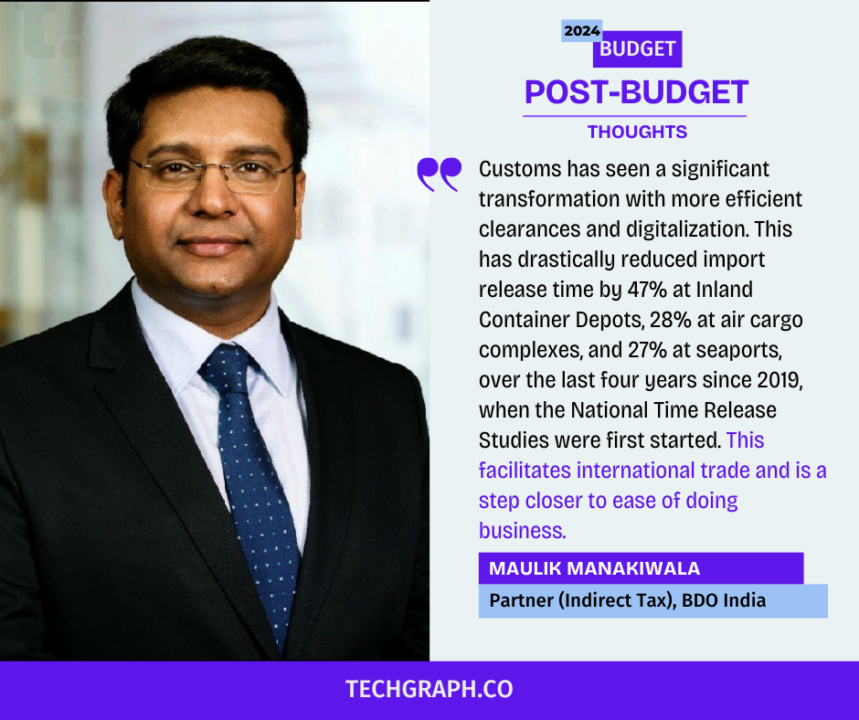
Customs has seen a significant transformation with more efficient clearances and digitalization. This has drastically reduced import release time by 47% at Inland Container Depots (ICD), 28% at air cargo complexes, and 27% at seaports, over the last four years since 2019, when the National Time Release Studies were first started. This facilitates international trade and is a step closer to ease of doing business (EODB).
Aryaman Vir, CEO of WiseX
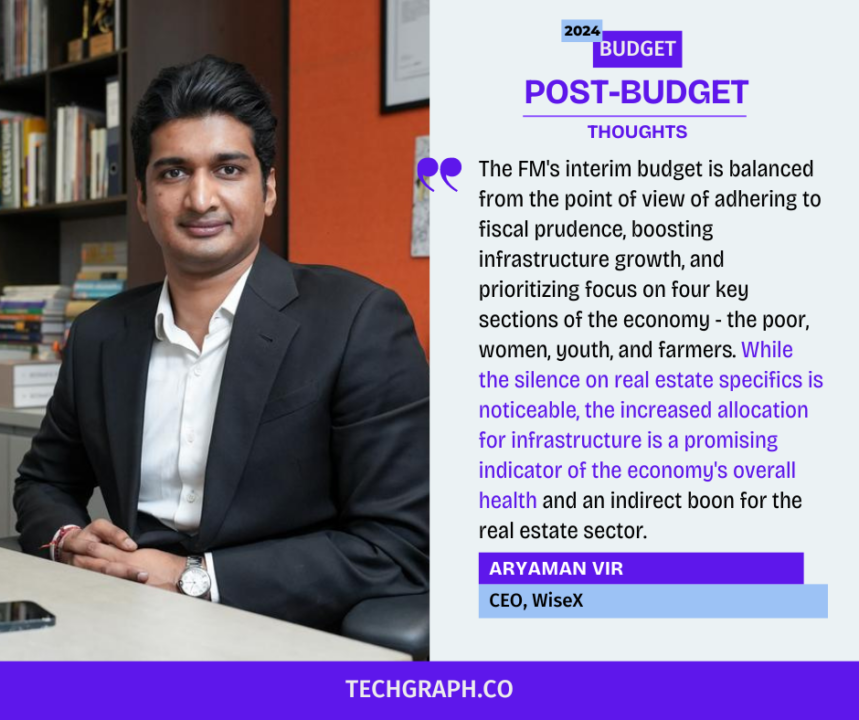
The FM’s interim budget is balanced from the point of view of adhering to fiscal prudence, boosting infrastructure growth, and prioritizing focus on four key sections of the economy – the poor, women, youth, and farmers. While the silence on real estate specifics is noticeable, the increased allocation for infrastructure is a promising indicator of the economy’s overall health and an indirect boon for the real estate sector.
The focus on reducing the fiscal deficit to below 4.5% by FY26 offers stability, likely to enhance investor confidence in Indian equities and bond markets. Of particular interest is the substantial ₹1 lakh crore innovation fund, a significant stride towards fostering technological growth. This is a beacon of optimism for startups and fintech firms, signaling strong governmental support for their crucial role in shaping India’s economic future
Sanjeev Ingti, Director & Co-founder, Eliea Wellness
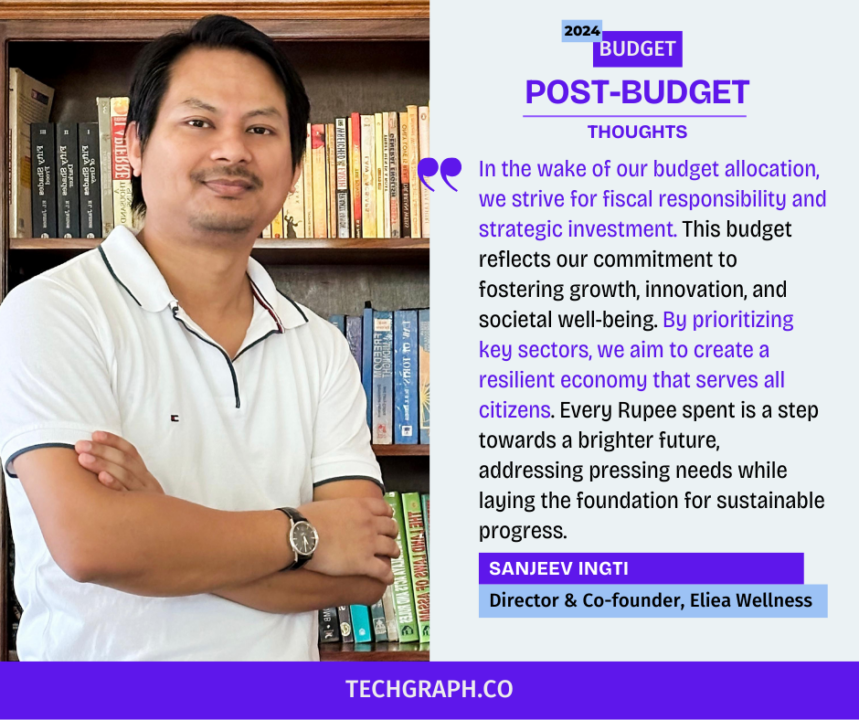
In the wake of our budget allocation, we strive for fiscal responsibility and strategic investment. This budget reflects our commitment to fostering growth, innovation, and societal well-being. By prioritizing key sectors, we aim to create a resilient economy that serves all citizens. Every Rupee spent is a step towards a brighter future, addressing pressing needs while laying the foundation for sustainable progress.
We understand the responsibility entrusted to us, and we pledge transparency and accountability in executing this budget. Together, we embark on a journey to build a stronger, more inclusive society, where the dividends of wise financial management benefit everyone. This budget is not just a financial plan; it’s a roadmap to prosperity, unity, and a better quality of life for our community. Let us move forward with optimism and determination, confident that our financial decisions today shape the destiny of tomorrow.
Lalit Arora, Co-founder, UBON
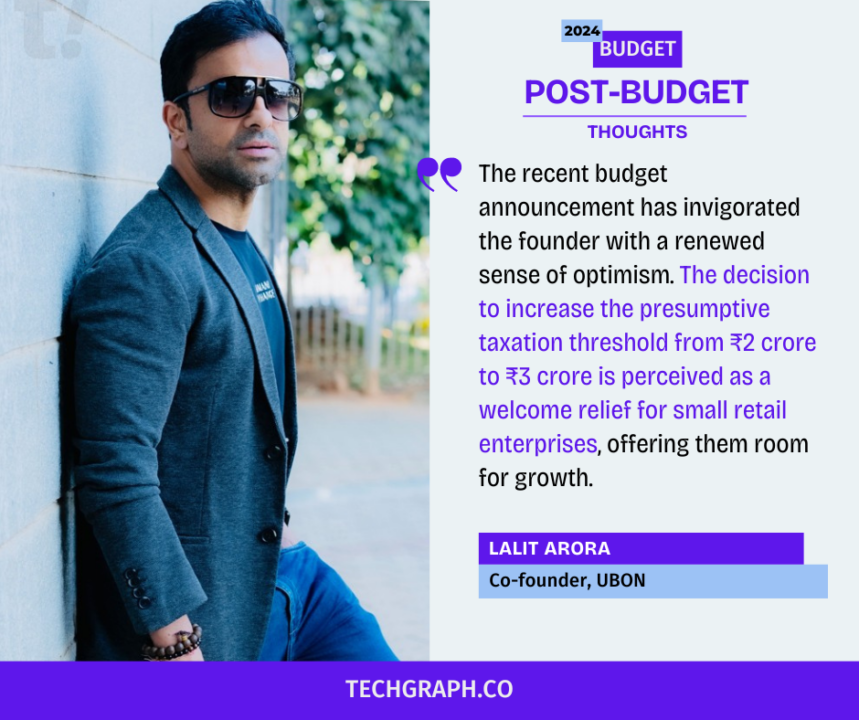
The recent budget announcement has invigorated the founder with a renewed sense of optimism. The decision to increase the presumptive taxation threshold from ₹2 crore to ₹3 crore is perceived as a welcome relief for small retail enterprises, offering them room for growth. The founder applauds the government’s commitment to fostering an environment conducive to development and productivity, evident in the forward-looking ‘Reform, Perform, and Transform’ approach.
The establishment of a substantial corpus with a fifty-year interest-free loan specifically tailored for the tech-savvy youth is hailed as a catalyst for innovation and entrepreneurship. This visionary move is expected to usher in a golden era of technological advancements. The founder is particularly appreciative of the strategic emphasis on strengthening defense technologies, aligning with the goal of self-reliance.
Ashish Saraf, VP and Country Director, Thales – India
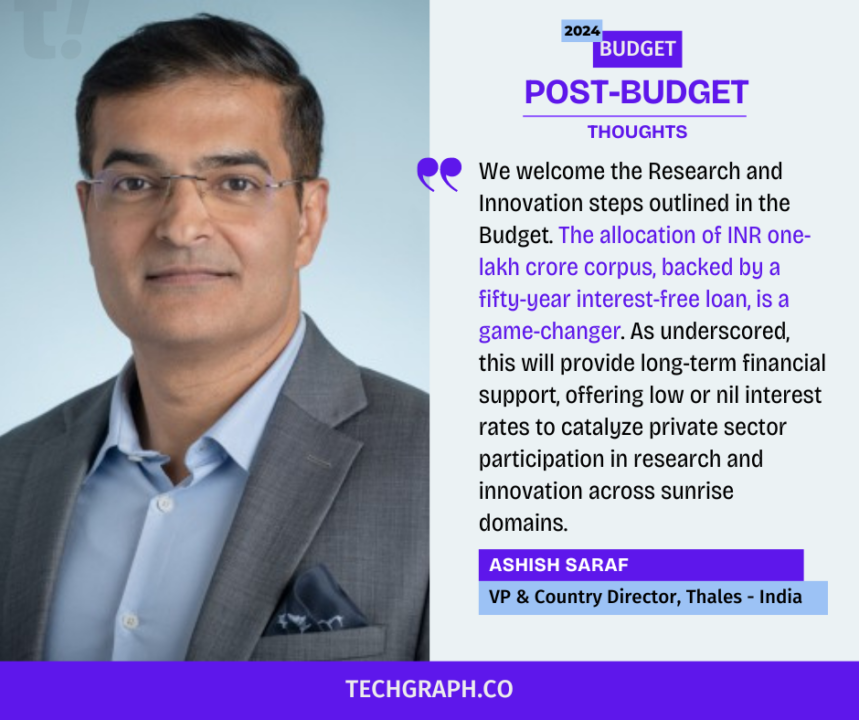
We welcome the Research and Innovation steps outlined in the Budget. The allocation of INR one-lakh crore corpus, backed by a fifty-year interest-free loan, is a game-changer. As underscored, this will provide long-term financial support, offering low or nil interest rates to catalyze private sector participation in research and innovation across sunrise domains.
This golden era for our tech-savvy youth will undoubtedly spur breakthroughs and drive progress. For Thales, R&D is collaborative by definition, and we work hand-in-hand with start-ups, industry partners, and the academic research community to provide our customers with the most advanced solutions possible. We look forward to leveraging our global tech expertise, continuing with our R&T efforts in India, and supporting in fostering the innovation ecosystem in the country collectively with the local teams, talent, and industry.
Prasad Sreeram, CEO & Co-Founder, COGOS
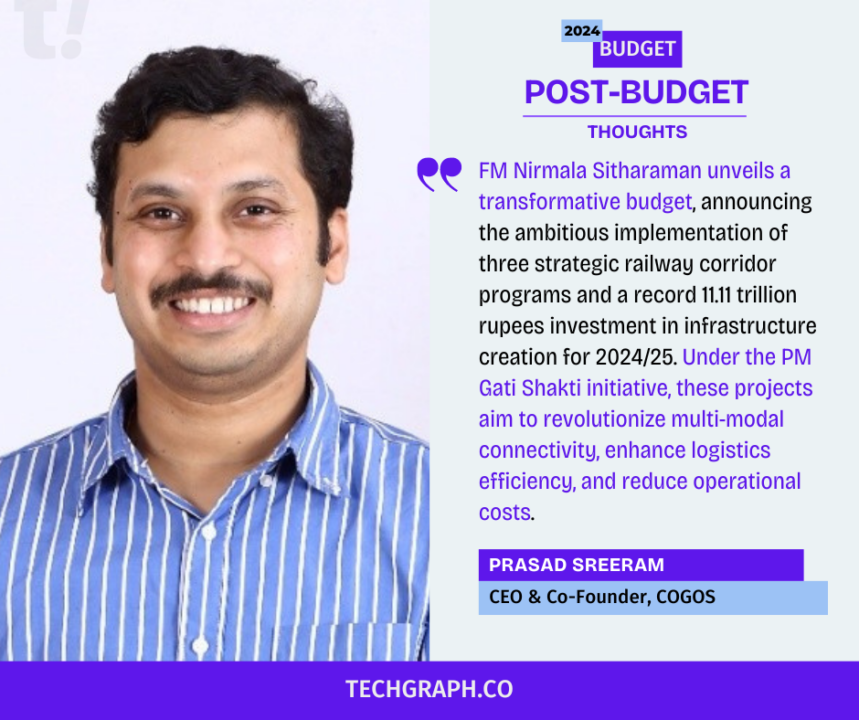
Finance Minister Nirmala Sitharaman unveils a transformative budget, announcing the ambitious implementation of three strategic railway corridor programs and a record 11.11 trillion rupees investment in infrastructure creation for 2024/25. Under the PM Gati Shakti initiative, these projects aim to revolutionize multi-modal connectivity, enhance logistics efficiency, and reduce operational costs, reinforcing India’s stature as one of the world’s fastest-growing major economies. The budget also supports startups by extending income tax benefits and increasing the benefit of carrying forward losses to 10 years. Additionally, a forward-looking approach allocates a Rs 1 trillion corpus for technology research, providing long-term financing with extended tenors and low or nil interest rates, propelling India into a new era of technological advancement and economic growth.
Pradeep Nagaraj, CFO & Director, ArivuPro Academy
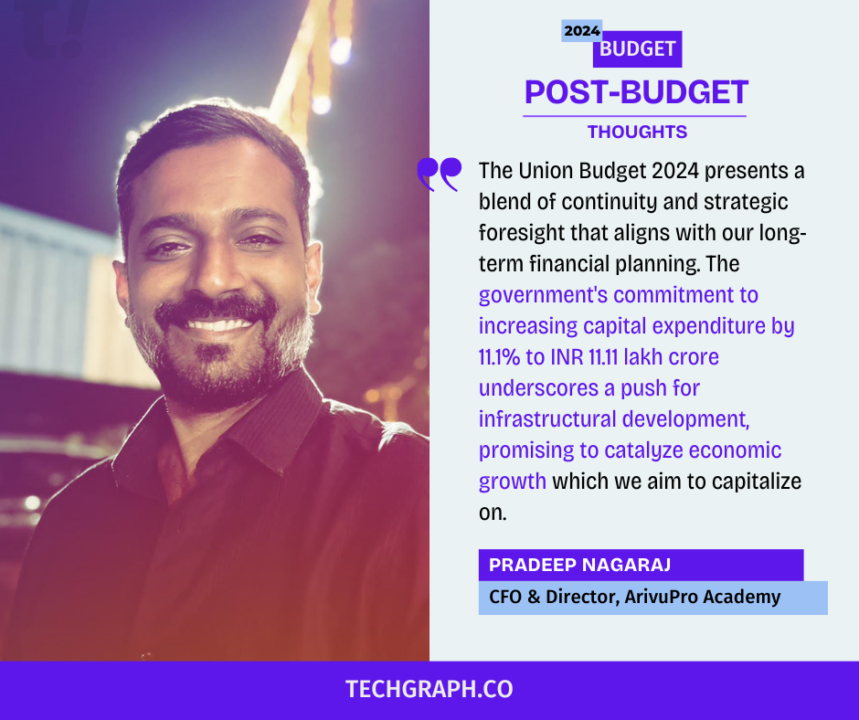
As the CFO, the Union Budget 2024 presents a blend of continuity and strategic foresight that aligns with our long-term financial planning. The government’s commitment to increasing capital expenditure by 11.1% to INR 11.11 lakh crore underscores a push for infrastructural development, promising to catalyze economic growth which we aim to capitalize on. The decision to maintain the current tax structure offers stability, allowing us to navigate fiscal policies with greater certainty.
Ravi Reddy, Chief Strategy Officer, Simplify3x
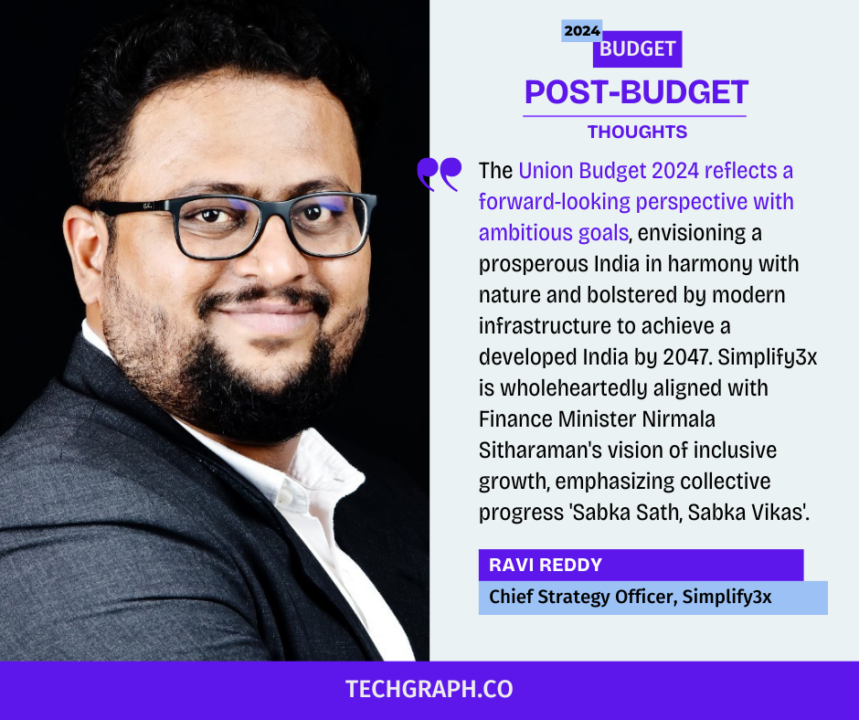
The Union Budget 2024 reflects a forward-looking perspective with ambitious goals, envisioning a prosperous India in harmony with nature and bolstered by modern infrastructure to achieve a developed India by 2047. Simplify3x is wholeheartedly aligned with Finance Minister Nirmala Sitharaman’s vision of inclusive growth, emphasizing collective progress ‘Sabka Sath, Sabka Vikas’. To catalyze technological innovation on a larger scale, a novel initiative has been introduced, involving the creation of a ₹1 lakh crore corpus, providing a 50-year interest-free loan. This strategic move aims to offer long-term financial support with extended tenures and minimal interest rates, ushering in an era of unparalleled development and golden opportunities for all stakeholders.
Avinash G Singh, Executive Vice President, Investment Research and Advisory, Aranca
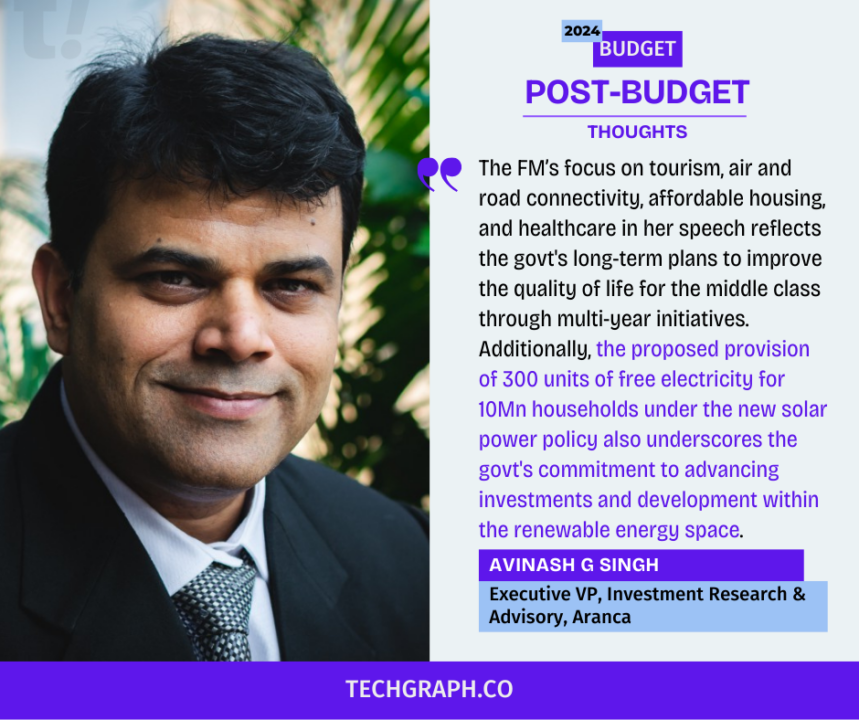
India’s Finance Minister, Ms. Nirmala Sitharaman, presented the interim budget for 2024, coinciding with the upcoming General Elections scheduled to be held this year. The key takeaways were not beyond expectations, considering that the main budget will be presented once the new government is sworn in at the center. That said, the FM’s focus on tourism, air and road connectivity, affordable housing, and healthcare in her speech reflects the government’s long-term plans to improve the quality of life for the middle class through multi-year initiatives. Additionally, the proposed provision of 300 units of free electricity for 10 million households under the new solar power policy also underscores the government’s commitment to advancing investments and development within the renewable energy space.
Vyshak Simha, CEO, viaDOTS
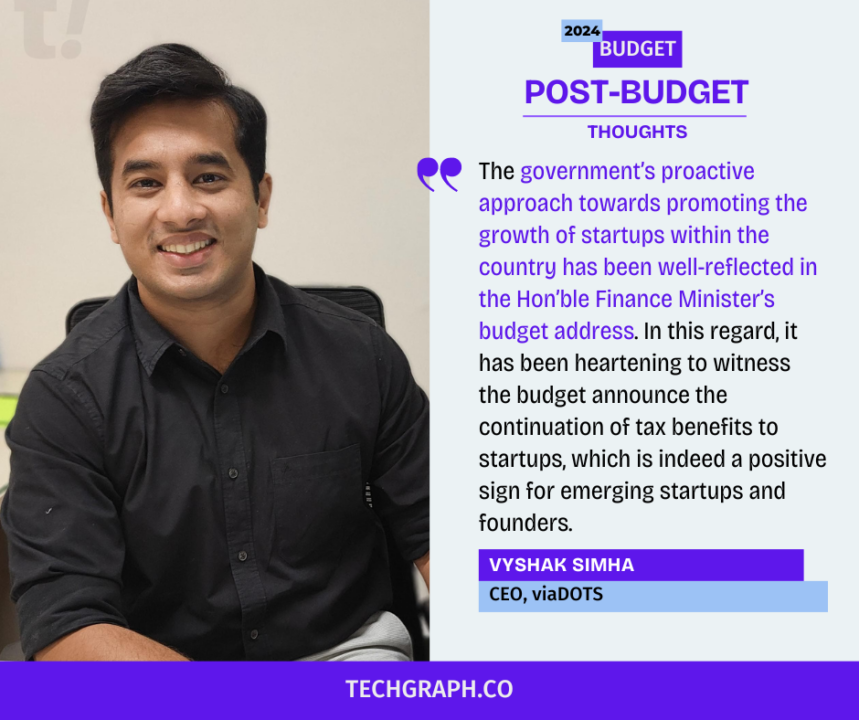
The government’s proactive approach towards promoting the growth of startups within the country has been well-reflected in the Hon’ble Finance Minister’s budget address. In this regard, it has been heartening to witness the budget announce the continuation of tax benefits to startups, which is indeed a positive sign for emerging startups and founders. The government’s proactive initiatives in establishing an environment conducive to the growth of startups will further enable us at viaDOTS to continue and expand our footprint to major cities across the country – offering an affordable and convenient transportation solution.
Danish Batra, Founder, Hair Masters
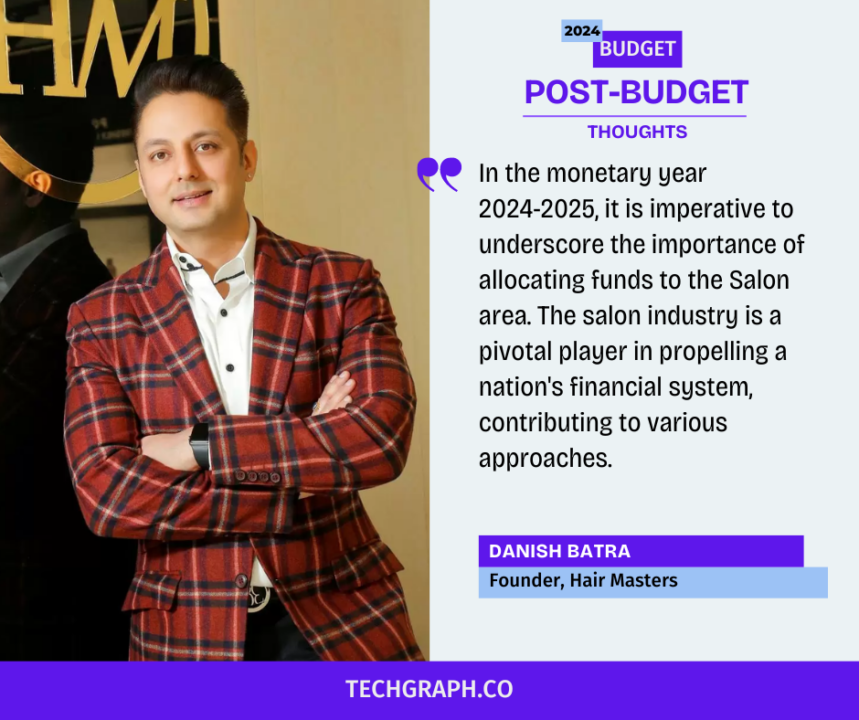
Beyond mere grooming, the Salon enterprise is a cornerstone of our socio-financial cloth, fostering entrepreneurship, employment, and well-being. In the monetary year 2024-2025, it is imperative to underscore the importance of allocating funds to the Salon area. The salon industry is a pivotal player in propelling a nation’s financial system, contributing to various approaches. From job creation that generates employment for hairstylists, aestheticians, nail technicians, receptionists, and aid staff, curtailing unemployment and elevating financial well-being to tourism and hospitality in which salons entice travelers searching for splendor services, reaping rewards in neighborhood economies and the tourism quarter.
Many salons are small companies, nurturing entrepreneurship, and contributing to the economy through taxes, licenses, and charges. Investing in schooling packages develops a skilled group of workers, enhancing human capital and competitiveness. Salon retail helps nearby and worldwide beauty manufacturers, contributing to the wider retail industry. Salon industry evolution drives technological advancements, contributing to broader financial growth. Salons enhance vanity and intellectual health, promoting basic populace productiveness and monetary positivity.



